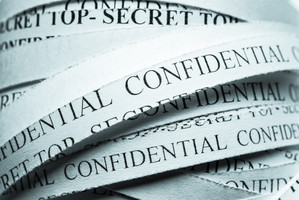Issues That Should Be Reviewed Regarding the Use of Videotaped Depositions

Courts are exercising their power under Rule[1] 30(b)(4) to society that depositions exist taken remotely and past videoconference during these uncertain times of the coronavirus pandemic. Such orders reverberate concerns almost the progress of cases, as discussed in our prior blog, and the public health. With remote depositions beingness essential nether electric current circumstances, attorneys demand to learn how to effectively and efficiently manage such depositions. We discuss here four aspects of remote depositions that crave special attention, and provide tips to help minimize technical difficulties, ensure confidentiality, and provide the examining chaser with reasonable control over the proceeding, all while post-obit the applicable federal and local rules and court orders.
Noticing a Remote Degradation
Rule xxx(b) authorizes remote depositions and requires that reasonable written observe of a deposition be given to all parties. Merely remote depositions raise unique issues. How should a remote degradation be noticed then?
Rule 30(b)(4) permits a wide degree of flexibility as to the particular "remote means" used to conduct the degradation. Dominion xxx(b)(1) requires that a degradation detect identify the fourth dimension and place of the degradation. In a remote degradation, this location is accounted to be the "place where the deponent answers the questions" under Rule 30(b)(4). Thus, as a applied affair, a find should specify when a degradation is to proceed by remote means, and what remote ways is being used with some specificity.
The ways chosen should allow for all participants – the deponent, examining counsel, defending counsel, court reporter, and any videographer – to participate in a deposition without attending the degradation in-person. The called means must enable the court reporter to administrate an adjuration to the deponent, as required by Rule 30(b)(5)(4). It should also be sufficiently reliable to enable the court reporter to accurately record the deposition, and to enable the deposing chaser, deponent and defending attorney to finer communicate with each other, including asking, responding to and objecting to questions during the deposition. In deciding which remote means to apply to take the deposition, attorneys should define whether the deponent (and other participants) has admission to adequate equipment for participating in the deposition, notably phone, Cyberspace access, computer, software, and peripherals (east.g., speakers, microphone, webcam, etc.). If not, the noticing attorney needs to figure out an appropriate way of providing the equipment.
Because a remote deposition is deemed to have place "where the deponent answers the questions," at that place can be bug with the authority of the court reporter and the admissibility of the testimony nether Rules 28 and 32. Under Rule 28, the deposition must be taken before "an officer authorized to administer oaths either by federal law or by the law in the place of examination" or "a person appointed by the court where the activity is awaiting to administer oaths and accept testimony." Because the court reporter is not in the same location as the deponent in some remote depositions, the court reporter may not be authorized in the jurisdiction of the deponent's location to administer oaths and take testimony. If the reporter is non and so authorized, the testimony taken from the deponent may not be admissible. To avoid admissibility objections to the use of testimony given during a remote deposition, attorneys should take intendance to select a reporter who is authorized to administer oaths in the location where the deponent volition be located during the degradation or, alternatively, seek court appointment of a reporter earlier the remote deposition commences.
Lastly, we note that Rule 30(b)(3) requires that a degradation discover land the method of recording the testimony. This applies every bit to in-person and remote depositions. Even if a remote deposition is conducted by videoconference, the notice must state whether the deposition volition be video recorded.
Managing Objections and Communications
 As has become apparent to virtually of us, videoconferences nowadays problems with participants talking over one another and the exterior noises of life under quarantine (e.yard., nearby family members, barking pets, etc.). In depositions, there is the added complication of a defending attorney interjecting objections between the deposing attorney's question and the deponent's answer, and the possibility of off-line communications with the witness.
As has become apparent to virtually of us, videoconferences nowadays problems with participants talking over one another and the exterior noises of life under quarantine (e.yard., nearby family members, barking pets, etc.). In depositions, there is the added complication of a defending attorney interjecting objections between the deposing attorney's question and the deponent's answer, and the possibility of off-line communications with the witness.
The formal process of a deposition ways that sound-video transmission delays may be less problematic in remote depositions than in remote conversations. Nonetheless, attorneys taking a remote degradation should remind the parties of the rules and protocols of professionalism and etiquette during a degradation. This includes reminding participants not speak at the aforementioned time, and to proceed microphones on mute when non really participating in the question-and-answering. Such a reminder may be fabricated in writing prior to the deposition, and orally at the beginning of, and periodically throughout, a deposition.
Defending attorneys may want to remind witnesses to pause before answering each question, to ensure that the attorney has time to brand whatever objections. Alternatively, attorneys may desire to consider a stipulation that objections tin be made after a question is answered.
Similarly, attorneys may wish to consider a stipulation that confined communication between the deponent and defending counsel other than to confer regarding the exclamation of a privilege. Unlike during an in-person degradation, the examining attorney may non exist able to discover whatsoever improper communication between the deponent and defending counsel.. For that reason, and beyond the stipulation noted higher up, attorneys may want to stipulate that the deponent's mobile device will be powered down during the entirety of the degradation or not used during the deposition (east.g., no texting between the deponent and defending counsel). Absent such stipulations, the examining attorney tin can inquire deponents what devices and materials they brought with them during the deposition, why they brought them, and whether they would voluntarily disclose when they are used.
Complying with Confidentiality Obligations
 Depositions in patent, trade secret and other business litigations often involve questioning most confidential business organisation information and documents. Attorneys participating in such a degradation remotely should consider how to manage the use of confidential business information and documents to avoid improper employ or disclosure.
Depositions in patent, trade secret and other business litigations often involve questioning most confidential business organisation information and documents. Attorneys participating in such a degradation remotely should consider how to manage the use of confidential business information and documents to avoid improper employ or disclosure.
As an initial affair, attorneys should await at any protective guild entered in their case to decide whether information technology contains any provisions that apply relate to remote depositions, including restrictions on the employ of designated information in a remote deposition.
For example, nether the Northern District of California's Model Protective Guild for patent and trade clandestine cases, extremely sensitive confidential business data cannot exist converted into electronic images or any electronic format. This includes source code and the like designated as "Highly Confidential – Source Code." Department ix(d) does allow limited portions to be used in a deposition in paper form. But Section ix(c) states that: "Inspection of such designated data is to be made available for inspection on a secured computer in a secure room without Internet access or network access to other computers, and the Receiving Political party shall non copy, remove, or otherwise transfer any portion of the source code onto any recordable media or recordable device." Given that almost video deposition platforms will create multiple instances of electronic images of such "Highly Confidential" business organization information over a network, attorneys are brash to discuss a protocol adequate to both sides for using such information in a remote degradation.
The handling of designated confidential business information in a remote deposition may too crave special tools for limiting access to that information. For instance, video deposition platforms offered by court reporting services typically afford party representatives the ability to listen in on and/or view the deposition. But these party representatives may be precluded from accessing Highly Confidential business data under a protective lodge.[2] In such cases, attorneys should consider protocols for identifying those attending remote depositions and restricting access to only those authorized to hear the testimony and view confidential exhibits.
Remote depositions using the Zoom platform have become very popular. In these depositions, participants are identified by name or e-mail accost in the awarding and the host (e.g., the deposing attorney) may be provided controls to selectively restrict or "blackout" sure participants access. It is incumbent on each would-be participant at these depositions to sympathise what access they and their client representatives will have to the testimony and exhibits and how that admission might exist restricted due to protective society bug.
Many video deposition platforms include a real-time transcript feed. In situations where sure participants are barred past a protective society from admission to confidential business information, information technology is of import that the feed not be accessed by those participants. 1 option is to conform with the courtroom reporter to create a split transcript for the designated confidential portion of the deposition, so that information technology is not accessible via the real-time feed.
Ensuring Sufficient Fourth dimension for the Degradation
 Given the number of bug and general unfamiliarity of almost attorneys with remote depositions, it is recommended that attorneys advisedly plan the deposition, including the logistics, to ensure smooth execution of the deposition.
Given the number of bug and general unfamiliarity of almost attorneys with remote depositions, it is recommended that attorneys advisedly plan the deposition, including the logistics, to ensure smooth execution of the deposition.
Attorneys should make certain that all of the participants possess adequate equipment (eastward.yard., estimator with webcam) and are familiar with its use. To this cease, a "dry-run" before the deposition is highly recommended. The participants should examination the organisation and familiarize themselves with its utilise. In addition, the examining attorney may want to provide a deponent with instructions on apply of the arrangement at the first of the deposition.
Even with experienced counsel and well-informed deponents, technical bug may arise during a deposition. Some deposition service providers also offer technical support during the deposition in case technical issues arise, but most charge a fee for this service. Given that technical issues tin delay the testimony, attorneys should consider edifice in additional time to conduct a deposition. For full day depositions, an early showtime is recommended and attorneys should confirm availability of the participants.
Attorneys may also want to consider agreements extending the corporeality of fourth dimension on the record for a remote deposition across the allotted seven hours. Extra fourth dimension on the record may exist justified, for example, to provide instruction on use of the system and in view of problems in coordinating among speakers. Extending the length of a deposition are familiar issues to nigh attorneys (e.g., for language translation), and at that place is aplenty precedent for extending the length of a deposition for good crusade.
Final Thoughts
Given today's realities, as various regions of the state continue to effect public health advisories and restrictions to combat the COVID-19 pandemic, remote depositions may become the norm for the near hereafter. As a result, litigators are encouraged to embrace this norm and work with their counterparts on managing these depositions thoughtfully and adequately. Dominion 26(f) affords attorneys an opportunity to talk over these issues as role of developing a case's discovery plan. Even if a discovery program has been agreed to and a Rule xvi social club entered, attorneys tin enter into stipulations for remote depositions and thereby streamline such depositions and avert disputes and related motion practice. In these ways, attorneys can help courts ensure the progress of litigations during the pandemic while likewise promoting the public health.
[ane] Equally used here, "Rule" refers to the Federal Rules of Civil Procedure.
[2] Meet, eastward.chiliad., NDCA Model Protective Lodge Section 7.3(b).
Source: https://www.iptechblog.com/2020/05/effectively-and-efficiently-managing-remote-depositions-requires-careful-thought/